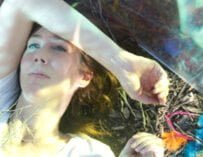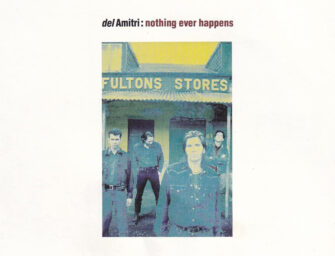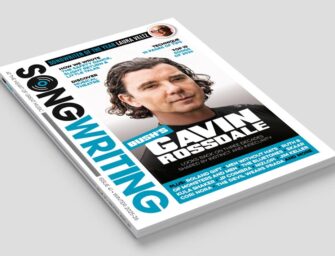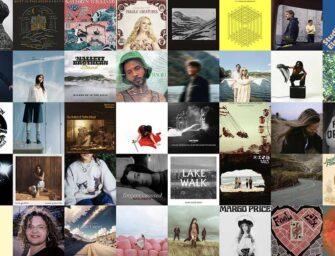
Matt Owens: “I’ve convinced myself there are songs in old guitars.”
The Bath-based musician, festival organiser and founder member of indie-folk band Noah And The Whale, talks about his new album
Way Out West, the new album from Bath-based singer-songwriter Matt Owens, his fourth, finds him digging deep to explore topics such as death, divorce, ageing, heartache, and the demise of the music industry. If that sounds heavy, there’s a deftness of touch and clarity of songwriting that lifts songs like 5 Years Into Marriage and You’re Not Gone out from the darkness. Rousing rockers, One For The Grapes, and nimble ditties, The Bard Of The Bars, round out this seriously strong collection of songs, making it an album you want to play from start to finish.
Helping the former Noah and the Whale man are the musicians who make up his band, The Delusional Vanity Project. Joining mainstays such as Jimmy Besley (drums), Duncan Kingston (bass), James Jack (guitar), Geoffrey Widdowson (keyboards), Jim Godfrey (piano), Camilla Skye (vocals), and Eddie Johns (drums) are guest appearances from Hannah White, Keiron Marshall and Robert Vincent. Unsurprisingly, the presence of so many accomplished musicians enhances the exceptional songwriting at the heart of Way Out West – making it an early highlight of the year.
Owens is also performing at and hosting The Songwriters Festival in Bath on 16 March, an intimate opportunity to see acclaimed songwriters and musicians performing in the round. With so much going on, let’s crack on with our chat…
How do you tend to approach writing a new album?
“I’m getting the exact same sensation that I always get once I’ve put out a record, which is I feel like I couldn’t have done any better. I try to make sure that’s the case, which is why I go to the well each time. But I’m also filled with the excitement of a white, blank page like, ‘Okay, so the next time I’ll do this differently…’
“For example, Beer For The Horses, my third record, I loved cutting it live with everyone in the room. Then you’re kind of like, ‘That went really well. I enjoyed that,’ but I then thought it would be cool to cut live again, because this record was cut live, but I wanted to add a little bit of production in certain places. And I was like, ‘That rocker worked better than I thought it would. So maybe if we had another one like that…’ and your mind just starts going.”
And what can you tell us about your writing process?
“I’ve learned over the years how to manage me best is to be unfettered. I’m really uncritical of unfettered excitement. There’s nothing worse than if you’re in a writing room, or writing with a band, and someone’s being negative. It doesn’t help, it kills it all stone dead. I’m much better off having something to edit.
“This sounds really decadent, but I buy a lot of guitars for the simple reason that I’ve convinced myself there are songs in old guitars. It’s also another reason for me to pick up a guitar and write something slightly differently, run it into a different amp… Now we can record everything on a phone, whenever I get an idea I get it down. I always try and do something different as well, because then it’s fresh and new.
“I also think of it in terms of a live setting. What do I want to play live? I think some guys are studio guys, like, ‘How would I make a record?’ And I very much do bear that in mind, but my bread and butter is playing live. We did the album launch and it was lovely to have the new songs adding to the live catalogue.”
That’s an interesting reflection on the changes in the industry, in that the live scene seems more important now than the physical/digital release. So it makes sense to have the live show in mind when you’re writing…
“I heard something from one of my heroes, James McMurtry, who’s this Texan singer-songwriter and he said that over his time, the whole industry has changed. Whereas you used to go out on the road to promote the record now it’s the other way around. You make the record so that you can justify being out on the road, which is where your money is.
“I didn’t get into this to be business savvy. If you can’t enjoy what we do, then you should probably go and do something else. I mean that in a good way because the guys I know who don’t enjoy playing live or writing, they often end up quitting. So the more you can enjoy it, the more you’re going to do it, and then it’s a self-fulfilling prophecy. I’ve learned to try and write songs I enjoy playing.”

Matt Owens: “The more you can enjoy it, the more you’re going to do it.”
Does it start with you and an acoustic guitar?
“I don’t struggle for writing music. But what often happens if I write music, I don’t have a song. I’ve learned that the hard way. I want songs that I can still play 20 years down the line. I’ve got a track on my first record, Whiskey And Orchids, that I’m still playing 20 years on. For me, the hardest thing about it is having an idea that’s sufficiently layered that stands up. And that’s why a lot of my verse are different scenes cut from different periods of the narrative, then held together by the chorus. Then, in my head, I can go to different places with it.
“I’m trying to write a three-chord song, because they’re my favourite, but often I write without a guitar and piano. I need to hear the melody in my head and the idea. Because of that, I often find that I’ve been thinking about the idea for much longer than I thought I had. For example, on the new record, Blindsided By Time was about a mate of mine who died tragically. I was trying to make sense of it all and as soon as that phrase came into my head, the song and the lyrics came very quickly. It turns out I’d been thinking about a lot of those issues for a long period of time. When I had something to hang it on, the rest of the song came pretty quick.”
What else can you tell us about how that one was written?
“That song is a slight anomaly for me actually, because the music/main melody had been from about 20 years previously. I’d had it knocking around for ages, in a different guise, just the verse. When the chorus came, it was the same pace. I found I could go back to another idea and crowbar that in. That’s unusual for me and something I’m trying to do more of.”
How else does it happen?
“You’re Not Gone, for example… I’d got, ‘You’re not gone,’ and the rest of the song came together pretty quickly. I was wanting to do something with a major seventh, because it was something new. The reason I often don’t go to guitar and piano and try to write is because, having done it for quite a long time, my hands go into patterns and I often end up repeating myself.”
So you’ll purposely give yourself those little challenges liking writing with a major seventh?
“I try not to repeat myself and sometimes I’ll force it into being. So I’ll play a major chord and go to a major seventh and go, ‘I haven’t done that before.’ Then I thought it was nice having an F sharp on a top of a C, that doesn’t work but I kind of liked it. I forced myself to listen to that. Then that was in my head, so you’re kind of pushing yourself into that. Once you can hear it, it’s on the table and there’s a chance you might go that way.”
Is there a point you have to get to before you bring other people in?
“What I try and do is give them a fully-realised demo with all the melodies and the structure. Sometimes there’s a horrendous second or third verse. I’ve normally got a good first verse and chorus in me and then the rest of the lyric sheet is often pulling teeth, carving away at what I’m actually trying to say.
“I’ll get 60 percent in the first lot, and that will come really quickly. Then the other 40 percent is me waking at two in the morning, agonising, chipping away… I’m quite hot on trying to make sure I’m in the right key so I’m not wasting people’s time. It’s a thing of economy. I don’t have endless money to waste and I don’t want to waste people’s time. I’ve been on the other end of that.
“If I’ve given them the melodies, I can hand over as much free rein as possible to the band. For example, for Blindsided By Time, I wrote the the melody on piano initially but I was able to say to my guitarist JJ, ‘I think this is an electric melody, see what you think.’ We switched it, I start playing and then he plays it and then he’s got freedom to go off. My point is that the bones of the track are all there. I don’t see the point of getting really good musicians in and telling them what to play. Because we’re just limiting our options then.”

Matt Owens: “I don’t see the point of getting really good musicians in and telling them what to play.”
Any other examples from the album of a song where someone did something particularly remarkable or surprising?
“We got Keiron Marshall in, who’s Hannah White’s guitarist, and he played my favourite guitar solo on the record on Hope The Darkness Pulls You Through. It lifted it in a really melodic but rocky way that I wasn’t necessarily seeing. I don’t want everyone going in knowing exactly what’s going to happen because then you’re not going to get that studio magic.
“If I can make sure that I’ve done the work and the song is as bulletproof as I can get it, structure-wise and lyric-wise, then we can go in different directions and everything will hold up. So that was a really nice one.
“Another one is my keyboard player, Jim Godfrey. On the track Morning Light, he started playing the midsection and it sounded so beautiful on piano we kind of stopped, and I was like, ‘Can you play that at the beginning?’ It sounded like an intro to me. So the second side of the record opens with this beautiful 30 seconds of piano which sets the tone perfectly. It was a melody that I written in on guitar or harmonica, then Jim lifts it by playing it on piano and it sounds completely different, much better.”
Is there another song you can use to highlight the process?
“I’ll give you two. Five Years Into Marriage took me ten years to write. A lot of that might have been talking myself out of doing it at all. I also probably needed to wait till my marriage was at least into its sixth year, which it now is thankfully. That went through so many different rewrites and processes because I wanted to get it right and commit myself to do it.
“The flip side of that is, and this rarely happens to me… I went to bed thinking the album was quite heavy and needed something lite, and I was playing The Grapes the next day. I kind of visualised what I wanted to play at The Grapes because I couldn’t go and play You’re Not Gone and Five Years Into Marriage. People aren’t in that headspace. I woke up in the middle of the night singing the riff to One For The Grapes. I did a voice note of it and then had to spend two hours the next day trying to work out how to play it, which was really frustrating.
“The reason why it’s the same four chords in a row is because, when musicians jump up, it’s really lovely to be able to say, ‘It’s these four chords.’ We did change it, we added a couple more in the midsection. Essentially, that’s the room writing the song.”
You also have the The Songwriters Festival coming up in Bath on 16 March. What can people expect from the day?
“It’s pretty nuts. It’s an amazing National Trust building. We’ve hired the Octagon Room, which is literally an octagon about 100-feet high underneath a chandelier that the White House tried to buy. It’s perfectly set up for acoustic music. It’ll be a 360-degree stage and for each main set you’re gonna get three songwriters for an-hour-and-a-half at a time, each playing a song and then passing it round. They’re all going to be looking in at each other with the audience sitting around them.
“This is an idea that many people might have seen in America at the Bluebird Café [in Nashville] but I know it from Ireland where The Dubliners and others used to sit in these beautiful old pubs out west. Often they’ve just got a mic hanging from the ceiling and when the cèilidh wasn’t on, you’d be sitting literally round this mic looking at each other doing rebel songs. This has been going on hundreds of years, so that’s what’s going to happen.”
Anything else you can tell us?
“We’ve got Electric Bear on tap, which is Bath’s finest craft beer. There’ll be lovely tables all around, and I’ve got a lot of rugs so that people can even sit on the floor. It’s a really intimate space and you’ll be able to sit around and watch.”
As well as your good self, which other songwriters do you have lined up to play?
“We’re really lucky, we’ve got Michelle Stodart of Magic Numbers fame, who’s just won UK Artist of the Year and UK Album of the Year artist at the UK Americana Awards. We’ve got Elles Bailey, who’s just won Live Act of the Year. We’ve got Hannah White, who’s won song of the year at the AMA Awards. We’ve got Robert Vincent, whose new album with Ethan Johns is his best to date. We’ve got Our Man In The Field, I’m incredibly excited to have those guys. I’ve never seen them live.
“It opens up the possibility for unlimited collaboration. When people are sitting across from each other, not only can they talk about songs… for example, I might sit in and play guitar with Elles on some of the songs that we’ve written together and then discuss them. But then also it’s the opportunity to jam, because you’re looking across at each other like the audience aren’t there. It’s incredibly intimate.”
































Related Articles